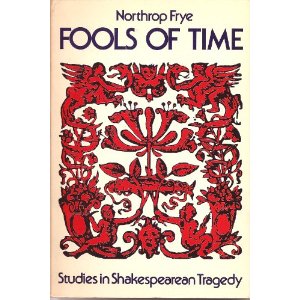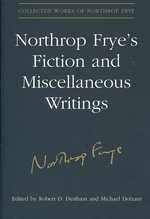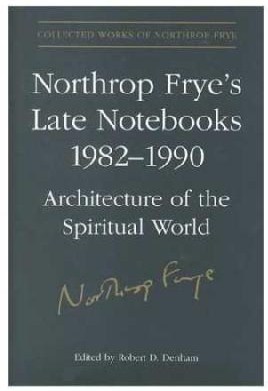
Cross-posted in the library here
This small holograph notebook, discovered in the bedside table of Elizabeth Eedy Frye following her death in May of 1997, is a Double Vision notebook. It was not included in Northrop Frye’s Late Notebooks, Collected Works, vol. 6. The numbers in square brackets at the end of some entries refer to the paragraph numbers in the typescript for Notes 53, where there is a similar or parallel entry. Parallel passages in Notes 54‑1 are also noted in square brackets. This is one of the few examples of Frye’s using a holography notebook as the basis for his typed notes. Transcribed by Robert D. Denham.
[1] Fiction. Cena form. Characters meet in a house with mind-bending characteristics. Paradoxes of time‑space (bilocation) and life‑death involved. Characters as Jungian archetypes: house is unity of social and individual body.
[2] Romantic archetypal characters: enough realism for a novel: cena form but an individual as well as group enlightenment. Some things take on a curious importance; Charles Williams, Mary Johnston’s Sweet Rocket [1920], things in other contexts I’d call second rate.
[3] Something to think about: not necessarily something to write.
[4] Myth absorbing history: prophecy and the sense of the “historical[.]” Not absorption but confrontation. Extreme of Egypt; extreme of pan-historical view now, when there’s a terrific itch for the “historical” Jesus. [194]
[5] Domination of history by myth: Egypt. In that nothing happens. Wonder if I should take the Byron epigram seriously,[1] & interpret my whole 8th ch. complex as history. [195]
[6] Two levels of history: aggressive and cultural. The aggressive is imperialistic & seeks the reconciliation of the pax Romana: agreement or the linguistically aggressive dogma. Cultural history interpenetrates: variety & unity, but no uniformity. [196]
[7] If so, then why “go into the world & preach the gospel”? Because the gospel was primarily aimed at Rome (Acts) & so, eventually, at the taking over of the Roman Empire, the Beast & Whore of Revelation. Of course this initiated what Blake calls the ages of Constantine & Charlemagne. (Blake’s 27th church is Luther; it should be Loyola.)
[8] Joachim: age of the Son or dividing Word up to 2000: age of the Spirit after that. [197]
[9] Logos from Heraclitus to Philo doesn’t mean word: it means a human consciousness linked to some principle of divine origin immanent in nature.[2] So the John logos, which returns to the Hebrew DBR,[3] is an extension. [198]
[10] Two: go on to Keats, G.U. [Ode on a Grecian Urn] (Wedgwood). In Blake it’s the trdnl. [traditional] spiritual–physical duality. Anyway an impersonal-objective vs. a personally-involving world. Connected by puns on law. Personal world imports a creator God––unless it’s the other way round. Yes, the disengagement of personal from impersonal worlds affects [effects?] purifying of religion. Providence. [199]
[11] Spengler’s “decline” applies to the empires who conclude the cultural process: as they decline they move towards a confrontation, or historical judgment. Three. [200]
[12] The Islamic revelation was a counter-apocalypse, which arose as a part of the Christian failure to separate the two worlds. They failed because science hadn’t developed far enough. Three. [201]
[13] Trace dialectic of the two worlds from the beautiful-true to the spiritual-physical. [202]
[14] One is the dialectic from “I believe that that really happened (in the past),” the red herring of discursive language, to “I see that that’s the way it has to be.” Study of poetry of course is training for us. All three form a larger dialectic running through language, space and time. [202]
[15] Orwell’s doublethink is the soul-body civil war where the consciousness hypnotizes itself into thinking it believes what the repressed consciousness knows to be nonsense. Fear of external authority creates internal repression. All genuine imgn. [imagination] is doublethink as Orwell defines it. [203]
[16] I suppose Blake’s distrust of memory is linked to the red herring of the past. [202]
[17] Red herrings: (1) it really means (2) it’s really there (3) it really happened. From metaphor to spiritual reality. [204]
[18] Imperial monuments follow the law of Ozymandias: they crumble. Genuine culture is tribal & regional. [205]
[19] Literature is the art of inscribing verbal patterns within a mythological cosmos. It starts as rhetoric, or the figuring of speech: as rhetoric passes into ideology it becomes kerygmatic or spiritual language. [206]
[20] Myth is the abstract form of narrative; later, in historical writing, it becomes the continuing form of narrative (“decline & fall” stage). Then it’s Weltgeschichte, & moves on to its confrontation in Heilsgeschichte. [207]
[21] Esse est percipi; but we know the world keeps on existing whether we see it or not: hence, for Berkeley, we trust that God keeps on watching it, as, to be consistent, the world must be an idea in God’s mind. It’s a good thing that, as the Psalmist says, God neither slumbers nor sleeps. [208]
[22] Lewis Hyde: we instinctively speak of cultural abilities as “gifts” (i.e. of the spirit).[4] [209]
[23] Law, besides the option of obeying it or not, may be just or unjust, logical (the original sense of logos) or arbitrary. [210]
[24] Feminism and metaphor: man for men & women. [211]
[25] If the Sabbath was made for man, the Church was too. [212]
[26] The ideologue identifies truth with whatever promotes his cause: the trouble is the mortality of causes. Truth, like the classic in literature, is whatever won’t go away, & keeps returning to confront us. I don’t know what “the truth” is in most matters, only that it’s likely to be connected with whatever returns until we deal with it. [213]
[27] (Logical positivism failed because it was the exact opposite of “the truth”]: only statements that make no sense have any validity.) [213]
[28] Interpenetration of belief is unity with variety, like metaphor: reconciliation, conversion, agreement, are all forms of (imperialistic) compulsion. [214]
[29] Truth is in the repeating pattern which forms the structure of knowledge. Unique experience has its own kind of truth, but it has no pattern. [215]
[30] Symmetry is the characteristic of the aesthetic-teleological world: occultism. [216]
[31] The feminist objection to “man” for “man & woman” is part of the literal fallacy.
[32] Conspiracy theories of history are fostered, first of all, by the paranoids in establishments. [216]
[33] Two worlds: one way of relating them is to consider the imgve. [imaginative] or made one as the real form of the other. Only this is usually a creation myth, where it’s God who makes both worlds. [218]
[34] Look up The Domain of Arnheim again:[5] Eco 57. [217]
[35] Look up [E.M.] Forster’s “only connect.”[6] Eros connects. [217]
[36] Eco’s comprehensive sendup of conspiratorial theories of history.[7] Of course, since Jacobins (and Jacobites) there have been conspiracies. Halfway between history & myth. [216]
[37] Three: immense importance of the imgve. [imaginative] way of life. Interpenetration & mythical history are subordinated to that. [219]
[38] Pagan sequence: first nature-gods reflecting the uncertain temper of nature: remote & unconcerned universal god (Lucretius later). Animals numinous: transformations of Zeus. [Notes 54‑1, par. 62]
[39] Transfer from nature to social gods (not a sequence). War, “wisdom” (cunning). Eventually some few realize that the true “god” is a Muse or Angel, an aspect of human creative power (Vita Nuova). This true “god” is transitional from idolatry to monotheism. [Notes 54‑1, par. 63]
[40] Only why gods of mousike rather than techne? [Notes 54‑1, par. 63]
[41] Man turning back on a million crosses in war cemeteries to explain how aggression has profound survival value. [Notes 54‑1, par. 64]
[42] Fraternity: aristocracy: snobbery. Sense that a real community has to be a minority, a small group. Link with tribal complex maybe. Also with the difficulties of the “king” metaphor about God. [Notes 54‑1, par. 65]
[43] The Jehovah of the O.T. is a humanized being, as violent & unpredictable as King Lear. We read in Plato & Plutarch about the “hyponoia” & other efforts to make the gods behave themselves & be proper role-models. The central image of man trying to make this creature into a decent God is Jacob wrestling with the angel. [Notes 54‑1, par. 66]
[44] Aristocracy: ancestor-worship: efforts to keep a time of continuity with our ancestors as (temporal) authors of our being, nature-gods in a true sense. Virgin Birth & pushing aside Joseph essential for the myth of the spiritual Father. [Notes 54‑1, par. 67]
[45] China & its heaven-earth axis: also featured in the Lord’s Prayer. [Notes 54‑1, par. 69]
[47] Essays from the valley: the pleasant valley, the Tao Te Ching valley, the valley of dry bones, of the shadow of death. Probably a fifth.
[48]] Who the hell is Arturus Rex? No evidence that he was ever a god or had a cult; the British fighter of Saxons is totally irrelevant. I mean the Arthur of Camelot, presiding over the Round Table, sending knights out on quests and collecting their defeated giants. Nobody like him before or, really, since.
[49] The two views of Tempest as (a) profound (b) potboiled not incompatible.
Continue reading →






